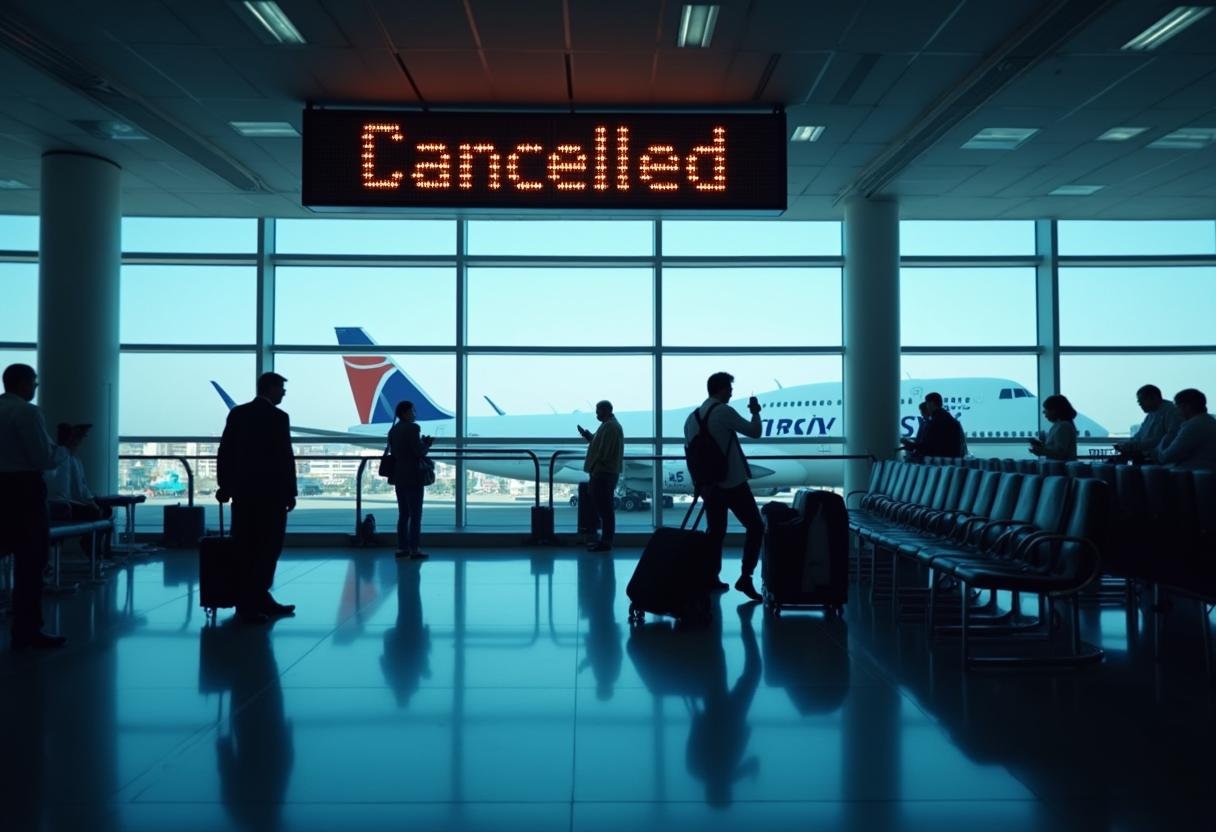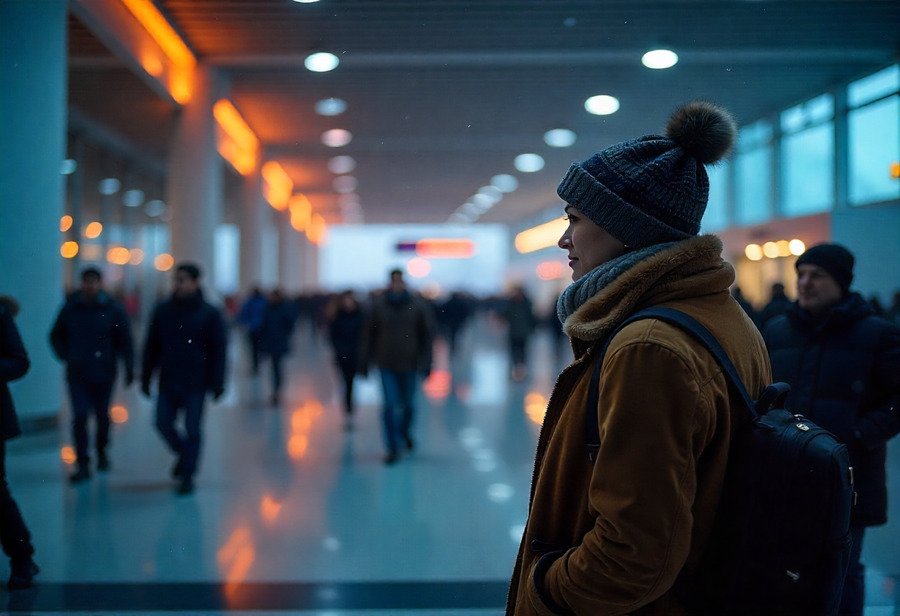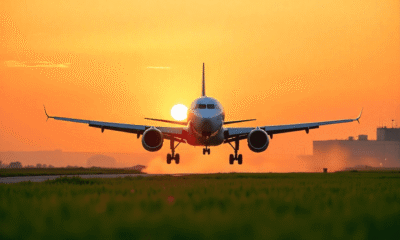Flight Buzz
Woman About To Board Flight, Then Takes Closer Look at Ticket: ‘Nightmare’

When Ruby, a 29-year-old marketing professional and travel content creator from Brisbane, Australia, prepared to board her international flight to the United States, she never expected a four-letter code would turn her routine travel day into a viral moment.
In a TikTok video posted on May 29, Ruby—known on the platform as @itsrubytravels—captured the exact moment she realized her boarding pass had been stamped with “SSSS,” an acronym for Secondary Security Screening Selection.
The short clip shows Ruby, who did not share her last name, standing at Brisbane International Airport, visibly shocked, her hands clasped over her mouth. The overlaid text reads “every traveler’s worst nightmare,” while the caption warns, “not the 4 letters no traveler wants to see on their boarding pass.” Since it was uploaded, the video has amassed more than 13.6 million views.
The incident occurred on May 28, just before Ruby boarded her United Airlines flight from Brisbane to San Francisco. She told Newsweek that she had previously encountered the SSSS designation only once before, on a flight to Europe “many years ago,” and described that prior event as “an isolated occurrence.”
“This was the first time I had encountered this on a flight to/from the U.S.,” Ruby said.
@itsrubytravels on TikTok
The code “SSSS” indicates a traveler has been flagged for additional security screening—a process governed by the Transportation Security Administration (TSA) in the U.S. It can include extra questioning, detailed searches of carry-on items, and personal pat-downs. Ruby’s experience followed that playbook almost exactly.
“I was pulled to the side while boarding the plane and asked to step over to a table located outside the boarding gate,” Ruby said. “They told me they were doing some additional security screenings.
“This was when they asked for my passport, and had me take out my laptop, phone, and take off my shoes. They swabbed these items and my body, including my hands and stomach.”
Global demand for air travel continues to surge. A June report from the International Air Transport Association (IATA) said that international travel demand rose 5 percent in May compared to the same period last year. Load factors, or the percentage of available seats filled with paying passengers, reached record highs.
“Air travel demand growth was uneven in May,” Willie Walsh, the IATA’s director general, said in a statement. “Globally, the industry reported 5 percent growth, with Asia-Pacific taking the lead at 9.4 percent. The outlier was North America, which reported a 0.5 percent decline, led by a 1.7 percent fall in the U.S. domestic market.”
What Is the ‘SSSS’ Code?
Experts told Newsweek that the SSSS code is part of a layered safety protocol.
Rich Davis is the senior security adviser at International SOS, a risk-mitigation company. Davis has a 40-year background in aviation security, including 22 years as the chief security officer at United Airlines.
“Secondary Security Screening Selection has been in place soon after the TSA was founded in 2001,” said Davis. “It’s a security process in which travelers are selected for additional screening protocols at the airport. The selection process includes random selection, as well as potential watch-list matches and other criteria.”
The screening process can include being asked additional questions, having your luggage inspected more closely, and/or receiving a pat-down from a TSA agent. The entire process could take anything from a few minutes or much longer.
In Ruby’s case, the screening took only a few minutes and did not cause any adverse delays to her trip to the U.S. “The entire process took less than 10 minutes, and I was back to boarding the plane as usual in no time,” she said.
Despite the swift processing time, Ruby’s reaction captured in the video highlights the stress and uncertainty that can come with being unexpectedly flagged for extra security.
“There was no explanation as to why I was selected for this secondary screening process,” Ruby said.
Ben Michael, an attorney from Michael & Associates Criminal Defense Attorneys, told Newsweek that this secondary screening is legal and unavoidable.
“You cannot opt out of SSSS,” Michael said. “Legally, TSA is allowed to make any person go through SSSS, and they actually don’t disclose the specific factors that make a person have to go through it. Also, sometimes it is just random.”
Davis noted that passengers can’t remove the SSSS designation once it is assigned to a flight but advised travelers to review TSA guidelines if they feel they are being misidentified frequently.
Michael advised those who find they are chosen for secondary screening frequently to contact TSA or the airline to see if they might be able to explain why. “You could even try getting something like TSA PreCheck that should help signal to TSA when you fly that you are a verified, safe traveler,” the attorney said.
Newsweek has contacted TSA for comment via email.
Do you have a travel-related video or story to share? Let us know via life@newsweek.com and your story could be featured on Newsweek.
Flight Buzz
Hawaiian Airlines launches ‘Sip and Soar Sweepstakes’ to celebrate local travel and culinary excellence : Maui Now

August 2, 2025, 4:00 PM HST
Hawaiian Airlines, in partnership with Sheraton Maui Resort & Spa and the Hawai‘i Food & Wine Festival, is inviting kamaʻāina to rediscover the beauty and flavors of West Maui through its new Sip & Soar Sweepstakes. The campaign, running through Aug. 31, offers Huakaʻi by Hawaiian members an exclusive chance to win an unforgettable Maui getaway.
The sweepstakes is part of Hawaiian Airlines’ ongoing commitment to supporting local travel and community events. One lucky winner will receive a Maui staycation package valued at $3,550, which includes:
- Two roundtrip neighbor island flight on Hawaiian Airlines
- A two-night oceanfront stay at the Sheraton Maui Resort & Spa
- Two priority access tickets to the “World of Wagyu, Wine & Whiskey” at the 15th Annual Hawai‘i Food & Wine Festival on Oct. 25 in Kāʻanapali
“This sweepstakes is our way of encouraging kamaʻāina, through our Huakaʻi by Hawaiian program, to reconnect with and support the vibrant community of West Maui,” said Alisa Onishi, managing director of Hawai‘i marketing at Hawaiian Airlines. “We’re honored to partner with Sheraton Maui and the Hawai‘i Food & Wine Festival to help spotlight the incredible culture, cuisine, and hospitality that make Maui so special.”
To enter, Hawai‘i residents must be 21 years or older and enrolled in Huakaʻi by Hawaiian by Aug. 31, 2025. Membership is free and offers exclusive benefits such as quarterly fare discounts, one free checked bag on interisland flights and access to special promotions.
All eligible Huakaʻi by Hawaiian members will be automatically entered into the sweepstakes. The winner will be notified via email and must accept the prize and applicable tax responsibilities.
For official rules and eligibility, visit HawaiianAirlines.com/OfficialRules.
Flight Buzz
ITA Airways Cancels Flights To Israel Amid Rising Tensions And Security Warnings

Sunday, August 3, 2025
In a major move affecting international air travel, ITA Airways, Italy’s national carrier, has announced the suspension of all flights from Italy to Israel until October 1, 2025. This decision comes as a response to the rising security situation in Israel. The ongoing conflict between Israel and Hamas has driven this precautionary measure. Many travelers now find themselves uncertain about their plans and must reconsider their flight options to and from Tel Aviv, Israel’s main international gateway.
ITA Airways, a member of the Lufthansa Group and the Star Alliance, shared this announcement through its official channels. The airline stated that the suspension stems from safety concerns for passengers and crew amid the unstable situation. While these measures aim to ensure safety, they also expose the broader challenges international airlines face when political or security issues arise.
Impact on Travelers: Stranded Passengers and Uncertainty
The suspension of flights from Italy to Israel has disrupted travel plans for many individuals and families who were set to fly between the two countries. Travelers with existing bookings should contact ITA Airways directly for updates on rebooking options or refunds. The airline has committed to helping affected passengers and is working closely with relevant authorities to address the situation.
The uncertainty surrounding the flight suspension shows the challenges international travelers encounter when political instability disrupts air travel. Passengers are encouraged to stay informed by regularly checking the airline’s updates and any travel advisories from official government sources. Those planning to travel to Israel in the coming months need to be flexible with their plans, as the situation can change based on security developments.
Broader Implications for International Air Travel
ITA Airways’ choice to suspend flights signals a growing trend among international airlines reassessing their operations in the Middle East over safety concerns. Several other airlines have altered their schedules or suspended services to Israel in recent months, citing similar risks.
The impact of such suspensions extends beyond tourism or business travel. It also affects diplomatic and cultural exchanges between countries. Israel and Italy have enjoyed a long-standing relationship, with many tourists and business professionals traveling between the two nations each year. The lack of direct flights creates a ripple effect that impacts various sectors, including hospitality, tourism, and trade.
For ITA Airways, the suspension is not just a temporary inconvenience for travelers; it could have long-lasting effects on tourism between Italy and Israel. For many, Israel has been a popular destination for historical and cultural tourism, especially for those interested in Jerusalem’s ancient sites, the Dead Sea, and the region’s religious significance. With flights suspended, there are concerns that tourism may slow down until security conditions improve.
Looking Ahead: Flexible Travel Options and Future Updates
While the flight suspension is expected to last until October 1, 2025, ITA Airways has stressed that they will regularly review the situation based on the security environment in Israel. The airline remains committed to passenger safety and will continue to monitor developments, providing updates as needed. It is also anticipated that flights to Israel will resume in phases once the security situation stabilizes.it
Travelers who planned to visit Israel should think about alternative routes or destinations for now. Many airlines offer connections to Israel through other European hubs like Frankfurt, London, or Paris. Some may also find it worthwhile to consider other Middle Eastern countries, such as Jordan or Egypt, which also boast rich cultural and historical significance and are relatively close to Israel.
Preventative Measures: Airline Responsibility and Passenger Safety
The flight suspension raises questions about the responsibility of airlines in facing global security threats. Airlines often temporarily halt or adjust their flight schedules in response to areas of conflict or places where risks of violence are high. In these situations, airlines must prioritize the safety of their passengers and staff. ITA Airways’ actions remind us how sensitive airline operations can be to changing geopolitical conditions.
As travel continues, passengers are encouraged to stay informed about security conditions in the region, consult official government travel advisories, and know their rights in case of a flight cancellation. Understanding passenger safety protocols and exploring insurance options can also offer travelers peace of mind during disruptions.
Conclusion: Managing Travel Amidst Uncertainty
The suspension of ITA Airways flights to Israel highlights the challenges airlines face when political instability disrupts travel plans. While the decision is mainly based on safety concerns, it underscores the complexities of air travel in unstable regions. For affected travelers, flexibility and patience are essential as they navigate the uncertainty of their future travel plans. As the security situation changes, airlines like ITA Airways will likely adjust their operations to ensure passenger safety, providing updates as new developments arise.
For now, passengers intending to travel to Israel from Italy should look into alternative routes or destinations and stay updated on flight operations. With global travel becoming more interconnected, the ability to adapt to unexpected circumstances remains crucial for ensuring safe and smooth travel experiences for all.
(Source: ITA Airways, Israel flight cancellations, flight suspensions, travel advisory, airline disruptions, international air travel, security concerns, Israel tourism)
Flight Buzz
Azerbaijan, Kazakhstan and Uzbekistan Open a New Chapter in Travel With Direct Flights, Visa-Free Entry, and Festival Tourism

Sunday, August 3, 2025
Azerbaijan, Kazakhstan, and Uzbekistan are reshaping the travel landscape in Central Asia by launching a new era of regional tourism defined by convenience, culture, and collaboration. With direct flights now linking key cities, visa-free entry easing cross-border movement, and a growing calendar of coastal festivals and cultural events, travelers from these three nations are enjoying easier, richer, and faster access to each other’s destinations. This new chapter in travel isn’t just about numbers—it’s about connection. Whether it’s a beachside music festival on the Caspian coast or a weekend getaway in the heart of Baku, the region is opening up in ways that are bringing people—and possibilities—closer than ever before.
Rather than casting a wide net globally, the country is strategically deepening regional ties to boost its tourism sector—reviving momentum lost during the global shutdown and laying new paths for future growth.
From Baku to Basqal, Familiarization Tours Show Off Azerbaijan’s Diversity
To showcase its offerings firsthand, Azerbaijan recently welcomed tourism representatives from Kazakhstan and Uzbekistan on a curated familiarization journey. The route led them through the cobbled streets of Baku’s historic core, into the tranquil villages of the Shamakhi highlands, and onward to Caspian beach resorts—each destination revealing a different face of the country’s tourism potential.
Along the coast, guests were treated to one of the season’s most anticipated cultural events—a music and lifestyle festival held steps from the sea. Combining regional talent with an open-air setting, the event struck a chord with visitors from neighboring countries, offering an experience that felt both exclusive and culturally familiar.
Tourism Industry Connects Regionally Through New Business Collaborations
To convert interest into long-term partnership, a regional tourism networking session followed the tour. Dozens of Azerbaijani hospitality brands, tour agencies, and resort operators sat down with Central Asian travel companies in a business-to-business format. The goal? Forge deeper ties, co-create travel packages, and open new promotional channels across borders.
This direct engagement with the industry helps ensure that Central Asian visitors aren’t just welcomed—they’re offered experiences and itineraries that feel tailor-made. It’s a smart approach, placing regional cooperation at the center of Azerbaijan’s tourism strategy.
Visitor Surge Signals New Momentum
Recent tourism figures show that this effort is bearing fruit. During the first six months of the year, Azerbaijan recorded over 68,000 tourist arrivals from Kazakhstan and Uzbekistan—marking a 15% rise compared to the same stretch last year. The numbers reflect a growing appetite for nearby, visa-free travel among Central Asian citizens, as well as rising awareness of Azerbaijan as a multi-season destination.
Thanks to improved air connectivity, traveling to Baku now takes less than three hours from many Central Asian cities. Multiple carriers are now operating direct routes from four Kazakh cities and two Uzbek hubs. For travelers seeking spontaneous weekend trips or short family vacations, this connectivity has made Azerbaijan both practical and desirable.
A Caspian Sea Ferry Project Hints at Future Mobility
Looking ahead, regional mobility may extend beyond air routes. Plans are being explored for a high-speed passenger ferry connecting the Kazakh port city of Aktau with Baku across the Caspian Sea. If developed, the service would not only offer scenic passage but also reinforce a historical link between the two regions—turning the sea into a corridor for tourism and commerce.
This waterway connection could create fresh possibilities for cross-border exploration, opening up multi-destination travel circuits across the Caspian basin.
Tourism Recovery Rides on Strategic Long-Term Vision
The recent regional push reflects a long-term vision that began years ago. In a bold move to rebrand its image, Azerbaijan launched a global marketing campaign in 2018 designed to reposition the country as a must-visit destination. Part of that strategy included opening overseas offices in key international markets and designing a new tourism identity that emphasized its cultural richness, landscapes, and modern appeal.
Before the pandemic struck, those efforts had started to pay off. The country welcomed over 3 million international visitors in 2019—its best tourism year on record. However, like nearly all destinations, Azerbaijan faced a steep drop in arrivals in 2020, as border closures and travel bans took their toll.
Rather than wait for global travel to bounce back, Azerbaijan is taking a proactive stance—starting with the travelers who are just a few hours away.
Conclusion: A Reimagined Tourism Future Begins at Home
Azerbaijan is tapping into something many destinations overlook: the power of regional travel. By focusing on its neighbors—countries with cultural links, shared histories, and easy access—it’s setting a blueprint for recovery that doesn’t rely on long-haul flights or distant markets. Whether it’s a quick escape to the Caspian coast, a music-filled weekend in Baku, or a mountain retreat in the highlands, the country is crafting experiences that appeal directly to Central Asian travelers.
And with visa-free travel, direct routes, and expanding partnerships, this new chapter in Azerbaijani tourism is just getting started.
-

 Brand Stories2 weeks ago
Brand Stories2 weeks agoBloom Hotels: A Modern Vision of Hospitality Redefining Travel
-

 Brand Stories1 week ago
Brand Stories1 week agoCheQin.ai sets a new standard for hotel booking with its AI capabilities: empowering travellers to bargain, choose the best, and book with clarity.
-

 Destinations & Things To Do2 weeks ago
Destinations & Things To Do2 weeks agoUntouched Destinations: Stunning Hidden Gems You Must Visit
-

 Destinations & Things To Do1 week ago
Destinations & Things To Do1 week agoThis Hidden Beach in India Glows at Night-But Only in One Secret Season
-

 AI in Travel2 weeks ago
AI in Travel2 weeks agoAI Travel Revolution: Must-Have Guide to the Best Experience
-

 Brand Stories4 weeks ago
Brand Stories4 weeks agoVoice AI Startup ElevenLabs Plans to Add Hubs Around the World
-

 Brand Stories3 weeks ago
Brand Stories3 weeks agoHow Elon Musk’s rogue Grok chatbot became a cautionary AI tale
-

 Asia Travel Pulse4 weeks ago
Asia Travel Pulse4 weeks agoLooking For Adventure In Asia? Here Are 7 Epic Destinations You Need To Experience At Least Once – Zee News
-

 AI in Travel4 weeks ago
AI in Travel4 weeks ago‘Will AI take my job?’ A trip to a Beijing fortune-telling bar to see what lies ahead | China
-

 Brand Stories4 weeks ago
Brand Stories4 weeks agoChatGPT — the last of the great romantics













You must be logged in to post a comment Login